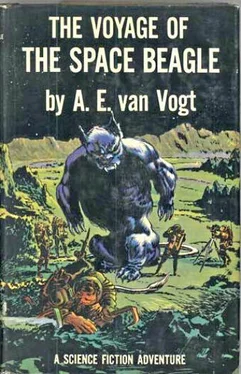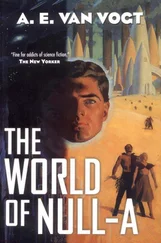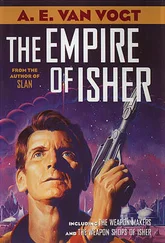Grosvenor took down the direction given, and then headed for the scene of the death. Almost immediately he discovered that Morton was not coming to look at the body. He heard the Director’s solemn voice on the communicator. “Bring the remains to the ship.”
Jarvey’s friends were present, looking sober and tense in their space suits. Grosvenor stared down at the horror of tattered flesh and blood-sprayed metal and felt a tightening in his throat. He heard Kent say, “He would go alone, damn him!”
The chief chemist’s voice was husky. Grosvenor recalled having heard that Kent and his principal assistant, Jarvey, were very good friends. Somebody else must have spoken on the private band of the chemistry department, for Kent said, “Yes, we’ll have to have an autopsy.” The words reminded Grosvenor that he would miss most of what was going on unless he could tune in. Hastily, he touched the man nearest him and said, “Mind if I listen in to the chemistry band through you?”
“Go ahead.”
Grosvenor kept his fingers lightly on the other’s arm. He heard a man say in a shuddering tone, “The worst part of it is, it looks like a senseless murder. His body is spread out like so much jelly, but it seems to be all there.”
Smith, the biologist, broke in on the general wave. His long face looked gloomier than ever. “The killer attacked Jarvey, possibly with the intention of eating him, and then discovered that his flesh was alien and inedible. Just like our big cat. Wouldn’t eat anything set before him—” His voice trailed into thoughtful silence. He went on finally, slowly, “Stay, what about that creature? He’s big enough and strong enough to have done this with his own little paws.”
Director Morton, who must have been listening, interrupted: “That’s a thought that has probably already occurred to a lot of us. After all, he’s the only living thing we’ve seen. But, naturally, we can’t execute him just on suspicion.”
“Besides,” said one of the men, “he was never out of my sight.”
Before Grosvenor could speak, the voice of Siedel, the psychologist, came over the general wave. “Morton, I’ve been talking by touch to a number of the men, and I get the following reaction: Their first feeling is that the beast was never out of their sight. And yet, when pinned down, they admit that maybe he was for a few minutes. I, also, had the impression that he was always around. But, thinking back over it, I find gaps. There were moments, probably long minutes, when he was completely out of sight.”
Grosvenor sighed, and deliberately remained silent now. His point had been made by somebody else.
It was Kent who broke the silence, He said in a fierce voice, “I say, take no chances. Kill the brute on suspicion before he does any more damage.”
Morton said, “Korita, are you around?”
“Right here at the body, Director.”
“Korita, you’ve been wandering around with Cranessy and Van Home. Do you think pussy is a descendant of the dominant race of this planet?”
Grosvenor located the archaeologist standing slightly behind Smith and partly surrounded by colleagues from his department.
The tall Japanese said slowly, almost respectfully, “Director Morton, there is a mystery here. Take a look, all of you, at that majestic sky line. Notice the architectural outline. In spite of the megalopolis which they created, these people were close to the soil. The buildings are not merely ornamented. They are ornamental in themselves. Here is the equivalent of the Doric column, the Egyptian pyramid, and the big Gothic cathedral, growing out of the ground, earnest, big with destiny. If this lonely, desolate world can be regarded as a mother earth, then the land had a warm, a spiritual place in the hearts of the inhabitants. The effect is emphasized by the winding streets. Their machines prove they were mathematicians, but they were artists first. And so they did not create the geometrically designed cities of the ultra-sophisticated world metropolis. There is a genuine artistic abandon, a deep, joyous emotion written in the curving and unmathematical arrangements of houses, buildings, and avenues; a sense of intensity, of divine belief in an inner certainty. This is not a decadent hoary-with-age civilization but a young and vigorous culture, confident, strong with purpose. There it ended. Abruptly, as if at this point the culture had its Battle of Tours and began to collapse like the ancient Mohammedan civilization. Or as if in one leap it spanned centuries of adjustment and entered the period of contending states.
“However, there is no record of a culture anywhere in the universe making such an abrupt jump. It is always a slow development. And the first step is a merciless questioning of all that was once held sacred. Inner certainties cease to exist. Previously unquestioned convictions dissolve before the ruthless probings of scientific and analytical minds. The sceptic becomes the highest type of human being. I say that this culture ended suddenly in its most flourishing age. The sociological effects of such a catastrophe would be an end of morality, a reversion of bestial criminality unleavened by a sense of ideal. There would be a callous indifference to death. If this — if pussy is a descendant of such a race, then he will be a cunning creature, a thief in the night, a cold-blooded murderer who would cut his own brother’s throat for gain.”
“That’s enough!” It was Kent, his voice curt. “Director, I’m willing to act as executioner.”
Smith interrupted sharply. “I object. Listen, Morton, you’re not going to kill that cat yet, even if he is guilty. He’s a biological treasure house.”
Kent and Smith were glaring angrily at each other. Smith said slowly, “My dear Kent, I appreciate the fact that in the chemistry department they would like to put pussy into retorts and make chemical compounds out of his blood and his flesh. But I regret to inform you that you’re getting ahead of yourself. In the biology department we want the living body, not the dead one. I have a feeling the physics department would like to have a look at him, also, while he’s still alive. So I’m afraid you’re last on the list. Adjust yourself to that thought, please. You may see him a year from now, certainly not sooner.”
Kent said thickly, “I’m not looking at this from the scientific point of view.”
“You should be, now that Jarvey is dead and nothing can be done for him.”
“I’m a human being before I’m a scientist,” Kent said in a harsh voice.
“You would destroy a valuable specimen for emotional reasons?”
“I would destroy this creature because he is an unknown danger. We cannot take the risk of having another human being killed.”
It was Morton who interrupted the argument. He said thoughtfully, “Korita, I’m inclined to accept your theory as a working basis. But one question. Is it possible that his culture is a later one on this planet than ours is in the galactic-wide system we have colonized?”
“It is definitely possible,’ said Korita. “His could be the middle of the tenth civilization of his world; while ours, as far as we’ve been able to discover, is the end of the eighth sprung from Earth. Each of his ten will, of course, have been built on the ruins of the one before it.”
“In that case, pussy would not know anything about the scepticism that made us suspect him as a criminal and a murderer?”
“No, it would be literally magic to him.”
Morton’s grim laugh sounded on the communicator. He said, “You get your wish, Smith. We’ll let pussy live. And if there are any fatalities, now we know him, it will be due to carelessness. There’s a possibility, of course, that we’re wrong. Like Siedel, I also have the impression that the creature was always around. We may be doing him an injustice. There may be other dangerous creatures on this planet.” He broke off. “Kent, what are your plans for Jarvey’s body?”
Читать дальше











